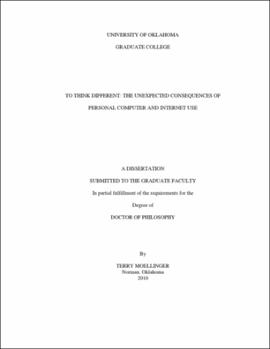| dc.description.abstract | This study examines the contemporary user patterns that emerged when a new medium--the personal computer and the Internet--was introduced into the user's media ecology. The study focuses on the introductory period and current usage. Data analysis conformed to practices accepted by oral historians (Richie, 2003, and Brundage, 2008), and grounded theory (Strauss and Corbin, 1998, and Charmaz, 2006), and was coded for dominant themes and categories. In terms of the development of technology within society, the study found support for Mumford (1934/1963), and other constructionist theorists, who argue that new technology is formed within a technological complex where social, historical, and environmental factors influence the shaping of technical innovation. In terms of the users this study found support for Rogers' (1995) assertion that the early adopters occupy the most important position in forming the pattern of acceptance within organizations. However, most importantly, this study confirmed Oudshoorn and Pinch's (2005) contention that for a new technology to be accepted it must the needs of the user. Turning to current usage, this study found that the media is not a neutral actor in the communication process. The use of the Internet encourages users to engage in their own private activities, and allows the user to become further isolated. In addition certain modalities of Internet communication elevated the importance of the thoughts and actions of the sender, and also underpin the validity of egocentric behavior. Most importantly, this study supports the notion that the speed at which knowledge is disseminated by new media, changes human perceptions of space and time, affecting cognitive processing patterns. | |
